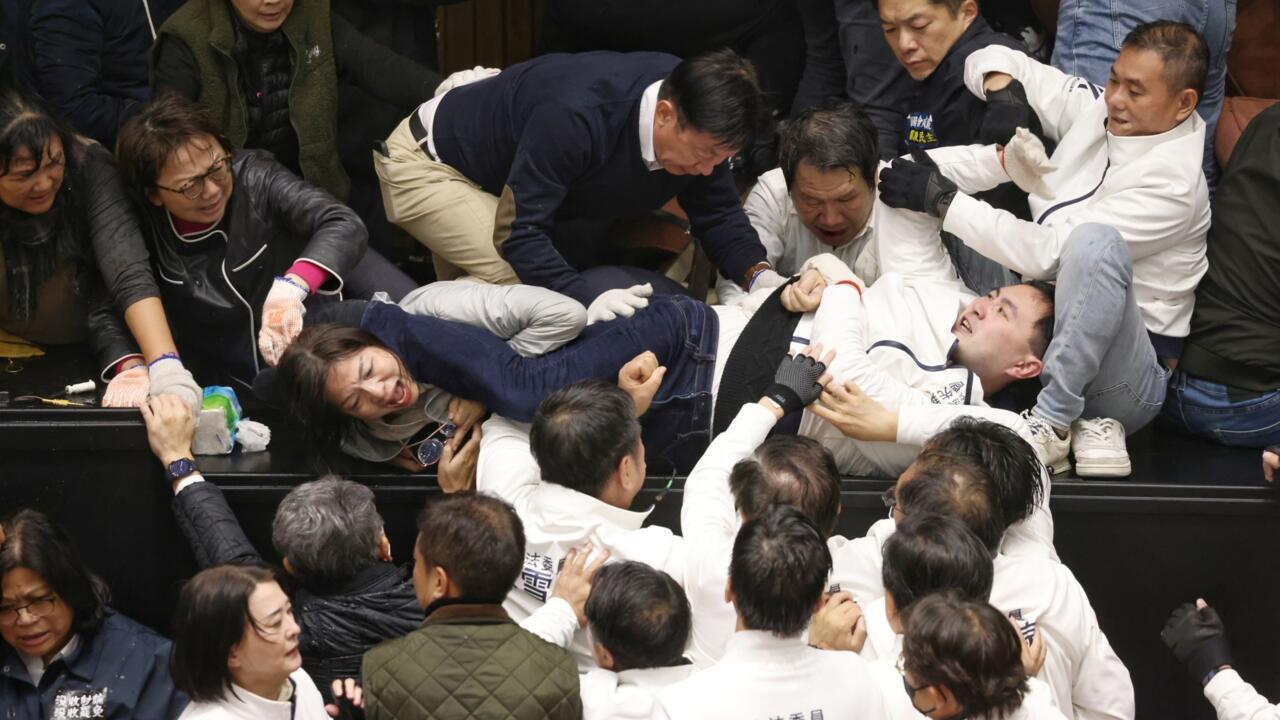Scores of lawmakers from Lai’s Democratic Progressive Party had occupied the podium of the parliament’s main chamber since Thursday night and barricaded themselves inside – piling up chairs to block entrances. The DPP parliamentarians were attempting to stop three legal amendments proposed by the opposition bloc, which would make it more difficult for voters to oust elected officials who they see as unfit.
“Parliamentary dictatorship,” some DPP lawmakers shouted to criticise the opposition Kuomintang (KMT) party and its ally Taiwan People’s Party (TPP) for trying to pass the bills with their majority.
“If the KMT forcefully passes the amendments… Taiwan’s democratic self-checking and self-repairing mechanism will be gone, and it will also cause significant and irreversible damage to Taiwan’s civil society and democratic system,” the ruling party said in a statement. “At a time when Taiwan’s democracy is being violated and damaged, we must stand up and take action,” it added.
Among the disputed bills was a planned revision to the Public Officials Election and Recall Act pressed ahead by the KMT and TPP to raise the threshold for removing elected officials. The Beijing-friendly KMT said it would prevent the power of recalls from “being abused” but some DPP lawmakers said they fear the move would revoke voters’ rights to remove unfit officials. Han Kuo-yu, the current parliament speaker from the KMT, was ousted in 2020 as mayor of southern Kaohsiung city following a failed presidential bid.
Outside the parliament on Friday, thousands of people gathered to protest the bills, shouting “return the evil amendments”, and “Defend Taiwan”. “I am here to protest the opposition parties for trying to confiscate the people’s rights to recall,” graduate student David Chen told AFP.



My initial take: this article seems really poor. Oversimplifying the KMT as being “pro-Beijing” is pretty typical of non-Taiwanese media talking about Taiwan, but calling the TPP their allies is very strange and seems aimed at pushing a very specific narrative.
But its biggest sin is that it reports basically nothing about the facts behind this issue. Wtf is the bill in question going to do?
This tells me basically nothing. Something about making recalls stricter, I guess.
Personally, I don’t like recalls as a general rule. It’s called an election. But in extreme cases it’s probably handy to have a way to get rid of representatives early. So if you have recall laws, but make them fairly hard to use (in particular, a higher bar than just losing at the next election), that’s probably the best case scenario. So in principle this policy actually sounds like not too bad an idea.
But for most people who probably don’t share my view (either because they haven’t put much thought in either way, or because they have and have decided they like recalls), the lack of information here seems tailor-made to make people think “DPP good, KMT bad”.
I sent the article to some Taiwanese friends of mine, mostly so they could laugh at the bad journalism, but also so I could get a more local perspective and understanding of what’s what. They sent through this article, with the recommendation to Google Translate it.
https://udn.com/news/story/123528/8438406
My take:
I don’t understand what purpose this would have. It does seem undemocratic.
Idk how I feel about this one. Assuming a two-stage process where first you have a petition and if the petition reaches a threshold then you hold a proper vote, I kinda like this. It’s a pretty neat way to ensure it’s always harder to get recalled than to lose an election. But considering the general trend of by-elections and other smaller elections having smaller turn-out than general elections, it seems like it might be too high a burden. Maybe something like a 2/3rd majority requirement for recall, unless the total turnout exceeds the turnout from the general election?
Eeeeek. FUCK NO. Voter ID laws are fucking shit.
That was my initial reaction. My friend did point out though that ID is already required for elections in Taiwan, and that apparently there is an actual history of voter fraud to justify this over there, unlike in, say, Australia or the US. I didn’t fact check this though, so I don’t know whether it’s true or if they’ve fallen for similar misinformation as is used to try to justify voter ID laws in the anglosphere.
I’d go the other way. Constant election polling is the worst thing to happen to democracy over the last 2 decades.
So my take away is that I like the goals, and the core of this is more good than bad. But it sounds like it’s also being used as an opportunity to introduce some changes that are quite harmful to democracy.
Oh, one final point. The barracading and rioting from the DPP seems absolutely silly. That’s not democracy, either. The KMT sound like they’re trying to follow normal conventional processes here. This isn’t like in Korea where riots and barracading were used to try and oppose autocracy.